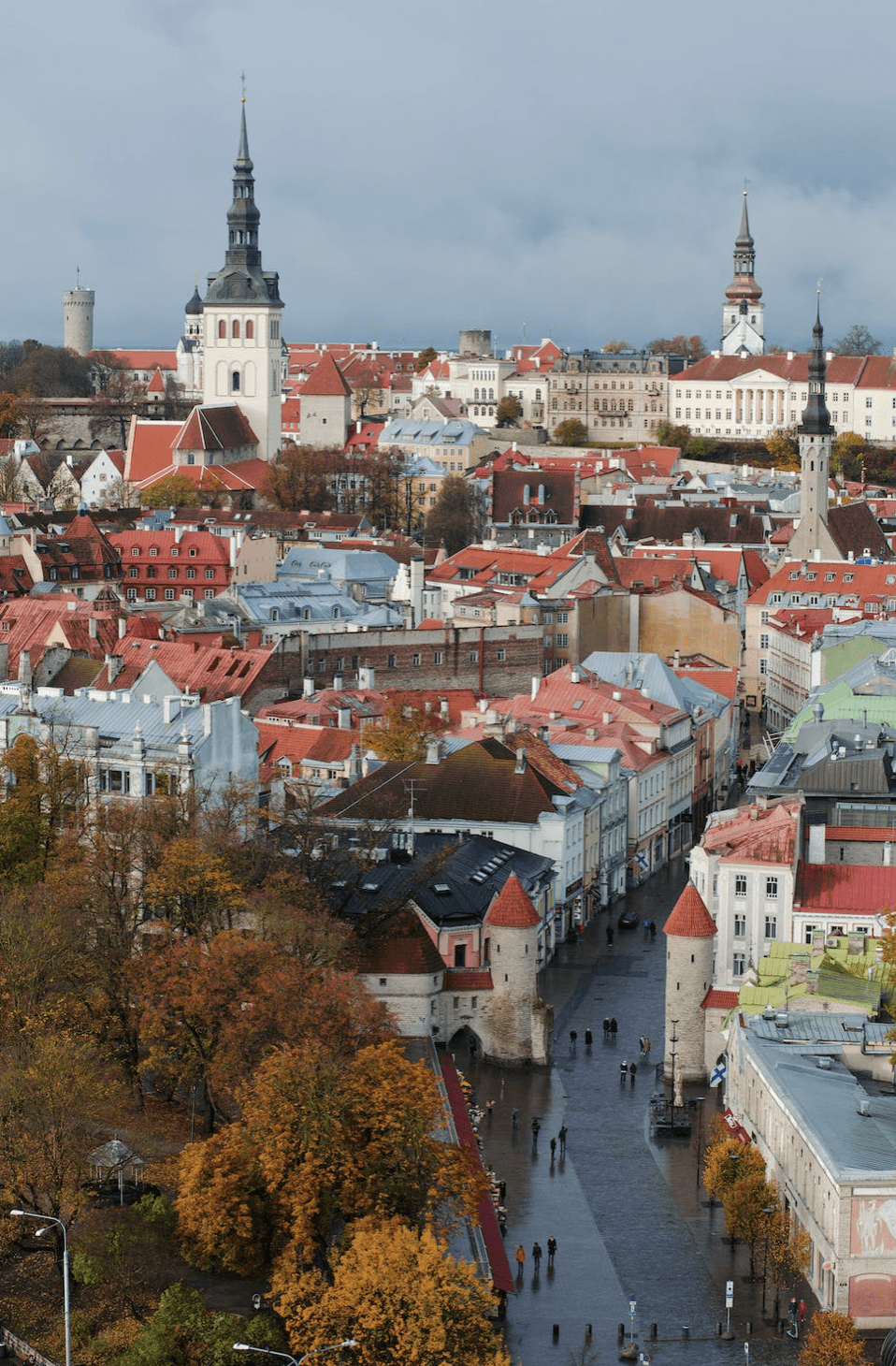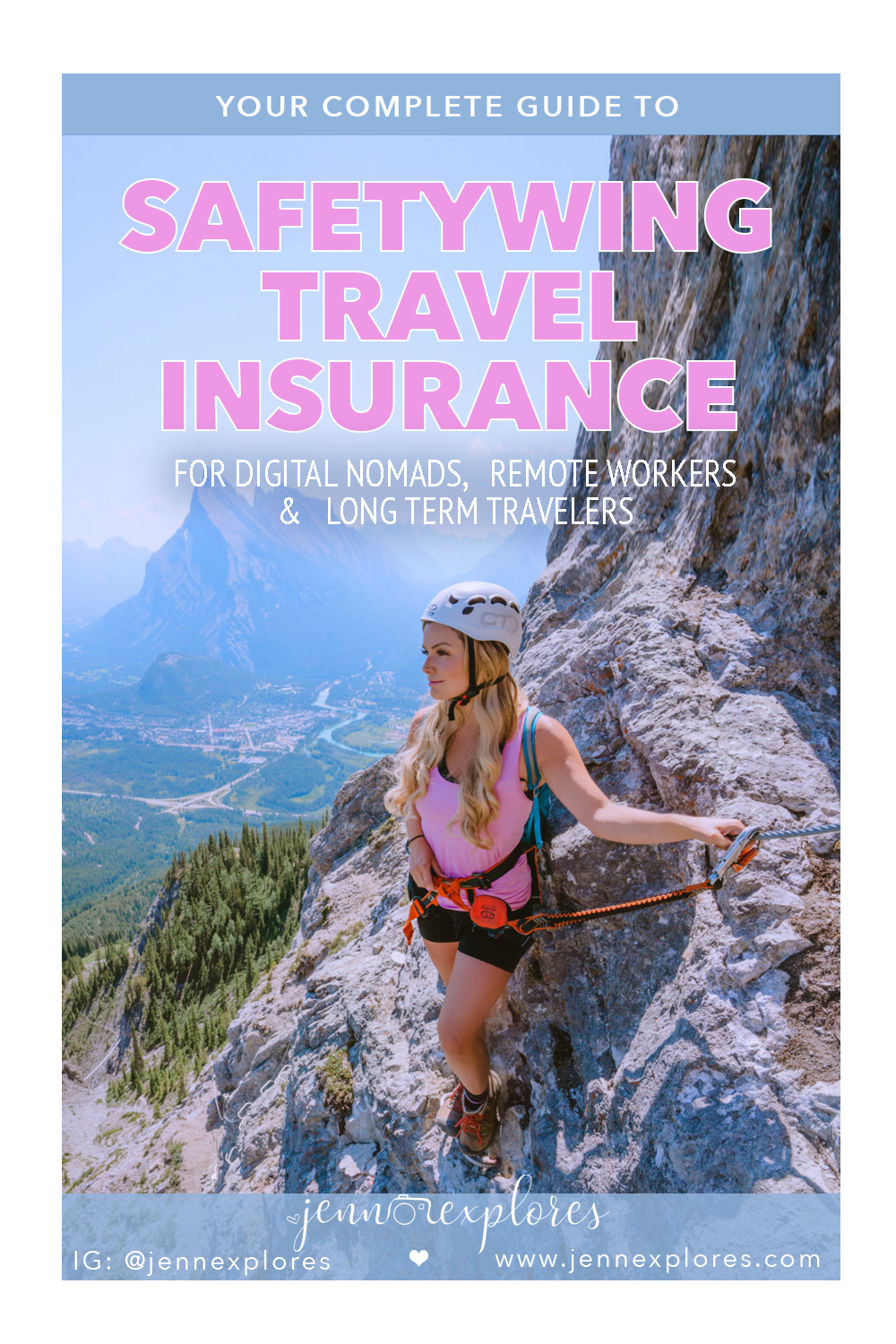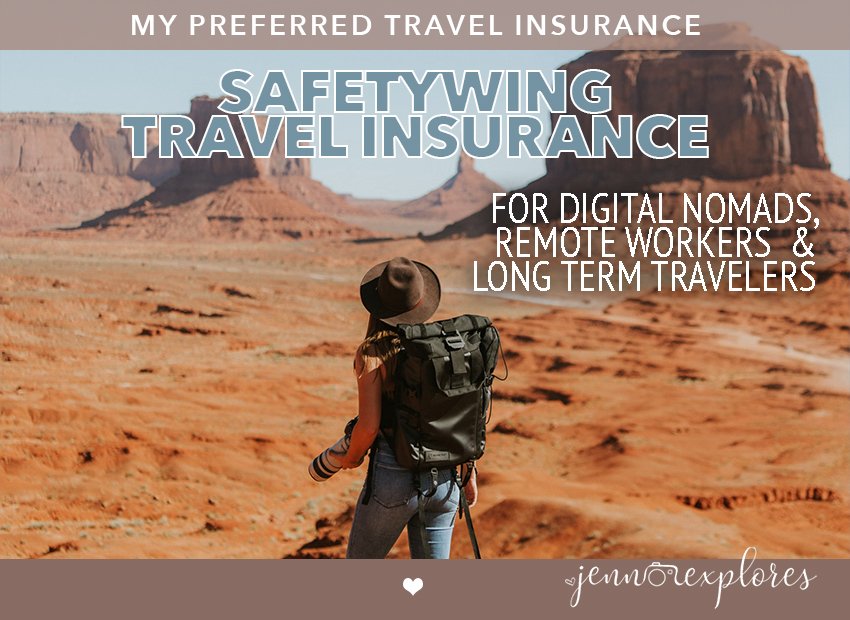
Hello, fellow travellers! If you’re on the hunt to uncover the secrets on how to create a life filled with wanderlust, adventure, and boundless opportunities, becoming a digital nomad or remote worker might be just the path for you.
In this blog, we will be diving into the exciting (and freeing!) world of remote work and explore the myriad reasons why it has become the ultimate dream for plenty of modern-day travelers and digital nomads alike.
If you dream of a life where your office extends beyond the confinements of four walls and city limits – a life where you can work from breathtaking mountaintops, white sandy beaches, or charming cafes nestled in bustling foreign streets – then becoming a digital nomad might be right up your alley.
Working remotely has revolutionized the way we view our careers, offering us the freedom to embrace a lifestyle that perfectly blends work and exploration. And the great thing is, ever since the Covid-19 pandemic, more and more employers have begun to see the benefit for allowing employees to work remotely, both from a financial savings perspective, as well as to encourage work-life balance!
In this blog, I’ll be your compass as we navigate the remote work landscape as we answer the question: Can I work remotely from another country?
Whether you’re a seasoned digital nomad in search of fresh inspiration or a curious soul ready to dip your toes into the world of remote work, this blog is your passport to learning how to do just that, but from another country.
Let’s get to it!

What are the different types of remote workers?
There are a handful of different types of remote workers, with the most popular types being as follows:
Remote Employees:
Remote employees are individuals who are employed by a company but do not work in a traditional office setting. They instead work from a location outside of the company’s physical offices, often from their homes or another remote locations.
Remote employees are provided with many of the same benefits as regular employees, such as company-provided benefits, maternity leave, paid time off, and access to company resources. They often match the company’s working hours and adhere to their policies. They may communicate with their team and supervisors mostly using digital tools and online platforms.

Hybrid Workers:
Hybrid workers are individuals who have a work arrangement with an employer that combines elements of both remote work and in-office work. They may split their work week between working remotely from home or other locations and coming into a physical office location for a portion of the time.
The specific arrangement can vary depending on the company’s policies and the nature of their job. Hybrid work models’ goals are to provide employees with flexibility while also allowing collaboration and face-to-face interactions as required or desired.
Independent Contractors:
Independent contractors are individuals who provide work from a company, but are not considered employees of a company. They work on a contract basis and are usually hired for specific projects or tasks. As independent entities, they have more control over how they perform their work and often are provided with the flexibility to choose their own working hours.
Independent contractors are responsible for paying their own taxes and may not receive the benefits that are typically offered to employees, such as health insurance or paid time off. They may choose to work from their own location or on-site, depending on the nature of their job and preferences.
Digital Nomads:
Digital nomads are individuals who embrace a location-independent lifestyle, often traveling and working remotely from various locations around the world. They use technology to perform their job tasks, allowing them to work from anywhere with a stable internet connection. Digital nomads are not tied to a specific employer or location and may work as freelancers, entrepreneurs, or remote employees for different companies. They have the freedom to choose their work environment and can explore new places while maintaining their professional commitments.
In summary: independent contractors work on a contractual basis, remote employees work outside the traditional office setting but are employed by a company,hybrid workerscombine remote work and in-office work arrangements, and digital nomads embrace a location-independent lifestyle while working remotely. Each of these work setups offers different levels of flexibility, benefits, and responsibilities.
Continue on to learn everything you need to know about working remotely from another country!


Can I Work Remotely From Another County?
Yes – you sure can, and I’m going to tell you all about why you should, how you can, and some important things to keep in mind as you set out on your journey of working remotely while living in another country!
Why should I consider working remotely?
Embrace the allure of a digital nomad lifestyle, where the world becomes your office, and your work-life balance transcends traditional boundaries. As the global workforce shifts towards remote work (thanks, Covid-19!), an exciting opportunity arises for adventurous souls seeking to combine work and exploration.
Welcome to the world of digital nomads and remote workers, where you can embark on a journey that takes you to breathtaking destinations while continuing to excel in your career. You can have it all, without having to give up your ability to earn income!
Work from Wherever You Want
Gone are the days of being tied to a physical office space. With technology as your ally, you have the freedom to choose where you work, from the bustling streets of foreign cities to serene coastal retreats.
Picture waking up to a new sunrise in a different country, surrounded by the richness of diverse cultures and stunning landscapes. As a digital nomad, your office can be a cozy café in Paris, a beachside hut in Bali, or a mountain lodge in the Swiss Alps – the possibilities are endless!

The benefits of remote work often outweighs the challenges
While the idea of working from exotic locations may sound like a dream come true, it does come with its unique set of challenges. Adapting to different time zones, navigating foreign customs and laws, and ensuring a stable internet connection are aspects that require careful planning and flexibility.
However, as you immerse yourself in the enchanting experiences of each destination, you’ll find that the rewards far outweigh the challenges.
Live an Unconventional Life – On your own terms
Imagine breaking free from the routine and monotony of a conventional job, and instead, seizing the opportunity to explore the world while earning a living. Not only does this lifestyle open doors to thrilling adventures and enriching encounters, but it also fosters a sense of personal growth and resilience.
Engaging with like-minded individuals from various backgrounds and cultures allows you to broaden your perspectives and forge connections that transcend borders.
Whether you’re seeking a short-term escape for a change of scenery or envisioning an extended stay in a foreign land, the digital nomad lifestyle grants you the flexibility to curate your ideal work-life balance. Take the leap into this transformative experience and discover a world where possibilities are boundless.
In this blog post, I’ll delve deeper into the logistics of remote work, offering valuable insights into overcoming challenges and maximizing the benefits of being a digital nomad.
So keep reading to unveil the secrets to working remotely from incredible destinations, and embark on a journey that blends work with exploration, adventure, and personal growth. The world is your office – let the exploration begin!

Do you need a visa to work remotely in another country?
If you are thinking about working as an independent contractor in a foreign country, it’s crucial to understand the visa requirements and legal implications. Depending on your own unique circumstances, you could require a tourist visa, a work permit, or the much-wanted digital nomad visas that some countries now offer to accommodate remote workers. More on those countries before!
For US citizens working remotely in foreign countries, the rules can vary depending on the host country and the type of work you’ll be doing. While some countries may allow short stays with just a tourist visa for remote work, others may require a specific work visa or residence permit. It really does vary depending on the country you’re looking to work from.
For remote employees of US companies, working in a foreign country can have tax implications; US companies should also be aware of the legal and tax requirements when having employees work in different countries.
While being a digital nomad can be an exciting opportunity to work while exploring. a different country, it’s essential to seek sound legal advice and comply with local laws to avoid any legal issues. For instance, some countries may require employers to establish a permanent establishment if they have remote workers in the country for an extended period.
For non-US citizens working remotely for US companies, understanding the immigration laws and tax regulations in both the home country and the host country is essential. Depending on the specific rules, tax authorities, and data protection laws, the tax withholding and social security contributions may vary. Consulting with experts in immigration and tax law can help you navigate the complexities and ensure a smooth and legally compliant remote work experience.
Remote working offers great flexibility and opportunities, but it also requires understanding and following to the legal and regulatory frameworks in both the home country and the host country. By staying informed and seeking professional advice, you can make your remote work experience abroad a rewarding and enriching journey. Make sure to check with the official websites of both your host country and target destination country to learn more about the legalities surrounding visa requirements.

How do I get a digital nomad Visa?
The much-coveted digital nomad visa vary in eligibility with each country, but they commonly require certain information to be provided:
Proof of Employment: Most digital nomad visas require evidence of ongoing employment with a company based outside the destination country.
Income Requirements: Digital nomads must demonstrate a minimum level of monthly income to qualify for these visas in some countries.
Tax Obligations: Tax laws differ in each country, and some may require digital nomads to pay taxes on the income generated while residing there.
Health Insurance: Some countries mandate you to purchase and hold valid travel and health insurance coverage for the entire duration of the visa.
The good news for remote workers is that many foreign countries have embraced the digital nomad trend and streamlined their visa application processes to make it more accessible!
With COVID-19 travel restrictions easing in most regions, remote workers can embark on adventurous journeys, choosing to stay in different countries for various durations.
You’ll be able to experience new cultures, witness awe-inspiring sights, and change the scenery of your home office, all while maintaining a fulfilling full-time position. It doesn’t get much better than that!

Is a work visa required for a short stay in a different country?
The requirement for a work visa during a short stay in a foreign country depends on several factors, including the host country’s policies and your country of residence.
Each country has its own visa regulations, and some may require a visa for any length of stay, while others have visa exemptions for short-term visits, typically up to 90 days, if the visit is for tourism or business purposes. If you’re entering a country solely for tourism and plan to work remotely without engaging in any local employment or business activities, a standard tourist visa may be sufficient for a short stay (check with the destination country).

However, if you intend to work remotely for an extended period or perform business-related activities within the visiting country, you may need to apply for a specific type of visa that allows for remote work or business-related activities.
To be sure of the visa requirements for your specific destination and circumstances, it’s best to check the official website of the country’s embassy or consulate, or the government immigration websites. They usually provide the most accurate and up-to-date information regarding visa regulations.

Best Countries to Work from Remotely:

Croatia:
Croatia’s “Digital Nomad Visa” allows for a year-long stay, attracting remote workers with its stunning coastline and historic cities.
Dubrovnik and Split offer charming old towns, co-working spaces, and reliable internet connectivity.
Croatia’s Mediterranean climate, beautiful national parks, and rich history make it a serene yet inspiring destination for digital nomads seeking a balance between work and leisure.

Estonia:
Estonia, a trailblazer in the digital nomad world, pioneered the concept of digital nomad visas in Europe. Back in July 2020, Estonia introduced its digital nomad visa, granting remote workers the opportunity to spend a year living and working or conducting business remotely within its borders.
Renowned as the Silicon Valley of Europe due to its impressive number of startups per capita, Estonia beckons digital nomads and freelancers seeking work flexibility and freedom.
Nestled amidst breathtaking natural landscapes, Estonia boasts one of the lowest population densities in Europe, with nearly half of its territory enveloped in lush forests.
For the nature-loving digital nomad yearning to reside in a country where nature is a constant companion, Estonia becomes an enticing option to explore.
The country’s e-residency program also grants access to a range of digital services, allowing remote workers to establish and manage their businesses seamlessly.
Tallinn, the capital city, offers a vibrant startup scene and co-working spaces, fostering a supportive community for entrepreneurs.
Estonia’s efficient public services, reliable internet connectivity, and innovative digital solutions make it a top choice for location-independent professionals.
Portugal:
Portugal’s “D7” visa program welcomes digital nomads with its flexible residency options. With a low cost of living and a pleasant climate, Portugal is a sought-after destination for those seeking a high quality of life.
Lisbon, Porto, and the Algarve region offer a mix of modernity and traditional charm, providing beautiful landscapes and a vibrant cultural scene. And Madeira is an amazing option for the nature and hiking lovers!
The country’s welcoming atmosphere, English-speaking population, and delicious cuisine make it an excellent choice for digital nomads seeking a relaxed yet inspiring environment.

Thailand:
Although Thailand lacks a specific digital nomad visa, it compensates with its welcoming attitude towards tourists.
Chiang Mai, a northern city, is a digital nomad hub known for its affordable living costs, friendly locals, and active expat community. Nomads are drawn to Thailand’s stunning beaches, bustling markets, and diverse cultural experiences.
The co-working spaces and reliable internet make it an attractive destination for remote work, offering a perfect blend of work and leisure opportunities.
Mexico:
Mexico’s friendly visa policy allows digital nomads to stay for up to 180 days visa-free.
Cities like Playa del Carmen and Mexico City offer a combination of modern amenities and rich cultural heritage. Mexico’s warm climate, beautiful beaches, and diverse landscapes provide a rejuvenating atmosphere for remote workers.
The affordable cost of living, vibrant nightlife, and delicious cuisine make it an appealing destination for those seeking adventure and exploration.
Germany:
Germany’s “Freelancer Visa” opens its doors to independent contractors and freelancers.
Berlin, the capital, has a thriving startup scene and co-working spaces, attracting digital nomads from around the world.
Germany’s efficient public transportation, cultural offerings, and work-life balance make it an excellent choice for nomads seeking a blend of professional growth and cultural immersion.

Bali, Indonesia:
Bali’s unique allure lies in its picturesque landscapes, tropical climate, and rich spirituality.
The island offers a range of co-working spaces, beachfront cafes, and wellness retreats, catering to the nomadic lifestyle. Ubud and Canggu are popular digital nomad enclaves, providing a supportive community of like-minded individuals.
Bali’s affordable living costs, friendly locals, and vibrant cultural scene create an enchanting backdrop for remote work and personal growth.

Costa Rica:
Although Costa Rica lacks a dedicated digital nomad visa, its welcoming atmosphere and laid-back lifestyle attract many remote workers.
The country’s abundant nature, lush rainforests, and pristine beaches provide an excellent escape from the hustle and bustle of city life.
Cities like San Jose and Tamarindo offer co-working spaces and reliable internet connectivity, making it a comfortable destination for digital nomads seeking tranquility and adventure.

Georgia:
Georgia’s e-visa system allows for a 90-day visa-free stay, making it an accessible destination for digital nomads.
Tbilisi, the capital city, has a burgeoning startup ecosystem and modern infrastructure.
Georgia’s low living costs, picturesque landscapes, and warm hospitality create a welcoming environment for remote workers seeking a unique cultural experience.
Vietnam:
Vietnam’s “E-Visa” program allows visitors to stay for up to 30 days without a visa. Ho Chi Minh City and Hanoi are digital nomad hotspots, offering a blend of urban excitement and cultural richness. Vietnam’s bustling street markets, delicious street food, and vibrant atmosphere create an immersive experience for nomads looking to immerse themselves in local culture.
These countries offer digital nomads a combination of factors, including ease of visa acquisition, vibrant co-working communities, affordable living costs, reliable infrastructure, and unique cultural experiences.
Whether seeking adventure, relaxation, or cultural immersion, these destinations provide a welcoming environment for digital nomads to thrive both personally and professionally.

As you can probably see, embarking on the journey of working remotely from a different country can be a thrilling and rewarding experience for both part-time and full-time employees seeking a change of scenery and new opportunities. However, it’s essential to navigate potential complexities like double taxation, income taxes, and tax residency carefully to avoid any legal entanglements with local authorities. In short – do your research first!
Exploring remote positions and employment opportunities within American companies or even local companies in the host country can open up a world of possibilities.


Why is it important for digital nomads and remote workers to have quality health insurance?
For digital nomads and remote workers, purchasing and maintaining quality health insurance is incredibly important! I personally use (and highly recommend) SafetyWing Travel Insurance for digital nomads and remote workers.
Invaluable for Your Peace of Mind:
Knowing that they are covered by health insurance brings peace of mind to digital nomads and remote workers. Traveling and working abroad can be unpredictable, and having health insurance alleviates the worry of facing financial hardships due to medical expenses!
Avoiding Astronomically-Expensive Surprise:
In some countries, healthcare costs for foreigners without insurance can be prohibitively high. Having health insurance can significantly reduce these costs and make healthcare more affordable for digital nomads and remote workers.
Medical Emergencies Abroad:
While exploring or living in new destinations, digital nomads and remote workers are exposed to different environments and activities. In the event of a medical emergency or illness, having access to quality healthcare becomes crucial. Having quality health insurance ensures that they can receive the necessary medical attention without incurring exorbitant out-of-pocket expenses.
Access to Comprehensive Healthcare:
Quality medical health insurance provides access to a wide range of healthcare services, including doctor consultations, hospitalizations, medications, and medical tests. This type of comprehensive coverage while traveling ensures that they can receive proper care for both routine health concerns and unexpected medical issues.
Visa and Immigration Requirements:
Some countries require proof of health insurance coverage for travelers to enter their borders or obtain visas. Having quality health insurance ensures digital nomads and remote workers can comply with these requirements hassle-free.
Quality health insurance is a vital safety net for digital nomads and remote workers, offering financial protection, access to comprehensive healthcare, and peace of mind while they embark on their adventurous journey around the world.
It ensures you can maintain their well-being and continue their pursuit of a fulfilling work-life balance, wherever their wanderlust takes them.
Learn more about SafetyWing Travel Insurance on this blog:
SafetyWing Travel Insurance Review 2023: Best Insurance for Digital Nomads

Whether you’re an American worker exploring the bustling streets of New York from afar or a British citizen working remotely in a European Union country, embracing the beauty of remote work can open doors to a world of opportunities. Embrace the diversity, embrace the experience, and revel in the magic of working remotely from a different country, as you seamlessly blend work and life in the global digital realm.
If you’re new to the world of remote working and wondering about which jobs you can do remotely, check out this blog post:
Work from Home Jobs Using Just Your Cell Phone
Let me know if you have any questions in the comments section below!

Other Blogs You’ll Love:
Freelance Job Ideas: The Best, High-Paying Freelance Job Ideas for 2023
Safest Places to Live in Mexico: Complete Guide for Expats
The Best and Worst Things about Life as a Digital Nomad
PIN FOR LATER































leave me a comment